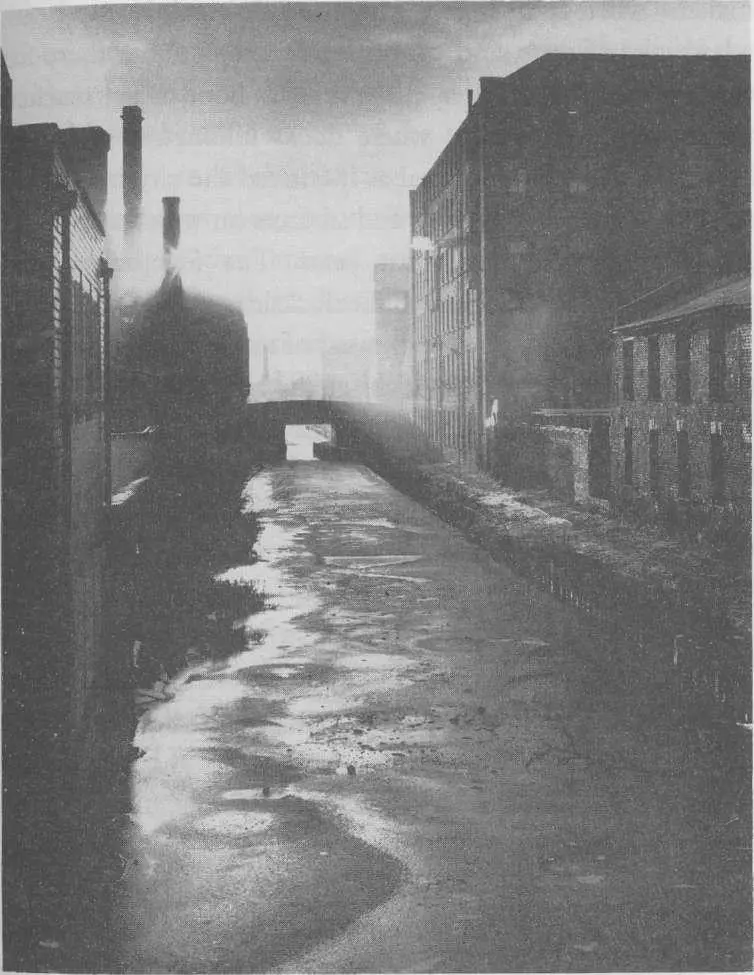
out of the shadow of one of the high buildings, into the light. I passed a long-disused gasworks, a coal depot, a bonemill, and what seemed the unending cast-iron palisade fence of the Ordsall slaughterhouse, a Gothic castle in liver-coloured brick, with parapets, battlements, and numerous turrets and gateways, the sight of which absurdly brought to my mind the name of Haeberlein & Metzger, the Nuremberg Lebkuchen makers; whereupon that name promptly stuck in my head, a bad joke of sorts, and continued to knock about there for the rest of the day. Three quarters of an hour later I reached the port of Manchester, where docks kilometres in length branched off the Ship Canal as it entered the city in a broad arc, forming wide side-arms and surfaces on which one could see nothing had moved for years. The few barges and freighters that lay far apart at the docksides, making an oddly broken impression, put me in mind of some massive shipping disaster. Not far from the locks at the harbour mouth, on a road that ran from the docks to Trafford Park, I came across a sign on which TO THE STUDIOS had been painted in crude brush-strokes. It pointed in to a cobbled yard in the middle of which, on a patch of grass, an almond tree was in blossom. At one time the yard must have been part of a carriage business, since it was enclosed partly by stables and outbuildings and partly by one- or two-storey buildings that had formerly been living quarters and office premises. In one of these seemingly deserted buildings was a studio which, in the months to come, I visited as often as I thought acceptable, to talk to the painter who had been working there since the late Forties, ten hours a day, the seventh day not excepted.
When one entered the studio it was a good while before one's eyes adjusted to the curious light, and, as one began to see again, it seemed as if everything in that space, which measured perhaps twelve metres by twelve and was impenetrable to the gaze, was slowly but surely moving in upon the middle. The darkness that had gathered in the corners, the puffy tidemarked plaster and the paint that flaked off the walls, the shelves overloaded with books and piles of newspapers, the boxes, work benches and side tables, the wing armchair, the gas cooker, the mattresses, the crammed mountains of papers, crockery and various materials, the paint pots gleaming carmine red, leaf green and lead white in the gloom, the blue flames of the two paraffin heaters: the entire furniture was advancing, millimetre by millimetre, upon the central space where Ferber had set up his easel in the grey light that entered through a high north-facing window layered with the dust of decades. Since he applied the paint thickly, and then repeatedly scratched it off the canvas as his work proceeded, the floor was covered with a largely hardened and encrusted deposit of droppings, mixed with coal dust, several centimetres thick at the centre and thinning out towards the outer edges, in places resembling the flow of lava. This, said Ferber, was the true product of his continuing endeavours and the most palpable proof of his failure. It had always been of the greatest importance to him, Ferber once remarked casually, that nothing should change at his place of work, that everything should remain as it was, as he had arranged it, and that nothing further should be added but the debris generated by painting and the dust that continuously fell and which, as he was coming to realize, he loved more than anything else in the world. He felt closer to dust, he said, than to light, air or water. There was nothing he found so unbearable as a well-dusted house, and he never felt more at home than in places where things remained undisturbed, muted under the grey, velvety sinter left when matter dissolved, little by little, into nothingness. And indeed, when I watched Ferber working on one of his portrait studies over a number of weeks, I often thought that his prime concern was to increase the dust. He drew with vigorous abandon, frequently going through half a dozen of his willow-wood charcoal sticks in the shortest of time; and that process of drawing and shading on the thick, leathery paper, as well as the concomitant business of constantly erasing what he had drawn with a woollen rag already heavy with charcoal, really amounted to nothing but a steady production of dust, which never ceased except at night. Time and again, at the end of a working day, I marvelled to see that Ferber, with the few lines and shadows that had escaped annihilation, had created a portrait of great vividness. And all the more did I marvel when, the following morning, the moment the model had sat down and he had taken a look at him or her, he would erase the portrait yet again, and once more set about excavating the features of his model, who by now was distinctly wearied by this manner of working, from a surface already badly damaged by the continual destruction. The facial features and eyes, said Ferber, remained ultimately unknowable for him. He might reject as many as forty variants, or smudge them back into the paper and overdraw new attempts upon them; and if he then decided that the portrait was done, not so much because he was convinced that it was finished as through sheer exhaustion, an onlooker might well feel that it had evolved from a long lineage of grey, ancestral faces, rendered unto ash but still there, as ghostly presences, on the harried paper.
As a rule, Ferber spent the mornings before he began work, and the evenings after he left the studio, at a transport café near Trafford Park, which bore the vaguely familiar name Wadi Haifa. It probably had no licence of any kind, and was located in the basement of an otherwise unoccupied building that looked as if it might fall down at any moment. During the three years I spent in Manchester, I sought out Ferber at least once a week at that curious hostelry, and was soon as indifferent as he was to the appalling dishes, a hybrid of the English and the African, that were prepared by the Wadi Haifa's cook, with an incomparable stylish apathy, in a set-up behind the counter that resembled a field kitchen. With a single, sweeping, seemingly slow-motion movement of his left hand (his right was always in his trouser pocket) the cook could take two or three eggs from the box, break them into the pan, and dispose of the shells in the bin. Ferber told me that this cook, who was almost two metres tall, had once been a Maasai chieftain. Now close to eighty, he had travelled (said Ferber), by which highways and byways he could not say, from the south of Kenya to the north of England, in the postwar years. There he soon learnt the rudiments of local cooking, and, giving up the nomadic life, had settled in to his present trade. As for the waiters, noticeably more numerous than the customers, who stood or sat around at the Wadi Haifa wearing expressions of the utmost boredom, Ferber assured me that they were without exception the chieftain's sons, the eldest probably somewhat over sixty, the youngest twelve or thirteen. Since they were each as slim and tall as the other, and all displayed the same disdain in their fine, even features, they were scarcely distinguishable, especially as they would take over from each other at irregular intervals, so that the team of waiters currently on duty was continuously changing. Nonetheless, Ferber, who had observed them closely and used the differences in their ages as an aid to identification, was of the opinion that there were neither more nor less than a dozen waiters, all told, whereas I for my part could never manage to picture those not present at any given moment. It is also worth mentioning that I never once saw any women at the Wadi Haifa, neither family or companions of the boss or his sons nor indeed customers, the clientèle being chiefly workmen from the demolition companies then busy throughout Trafford Park, lorry divers, refuse collectors and others who happened to be out and about.
Читать дальше













